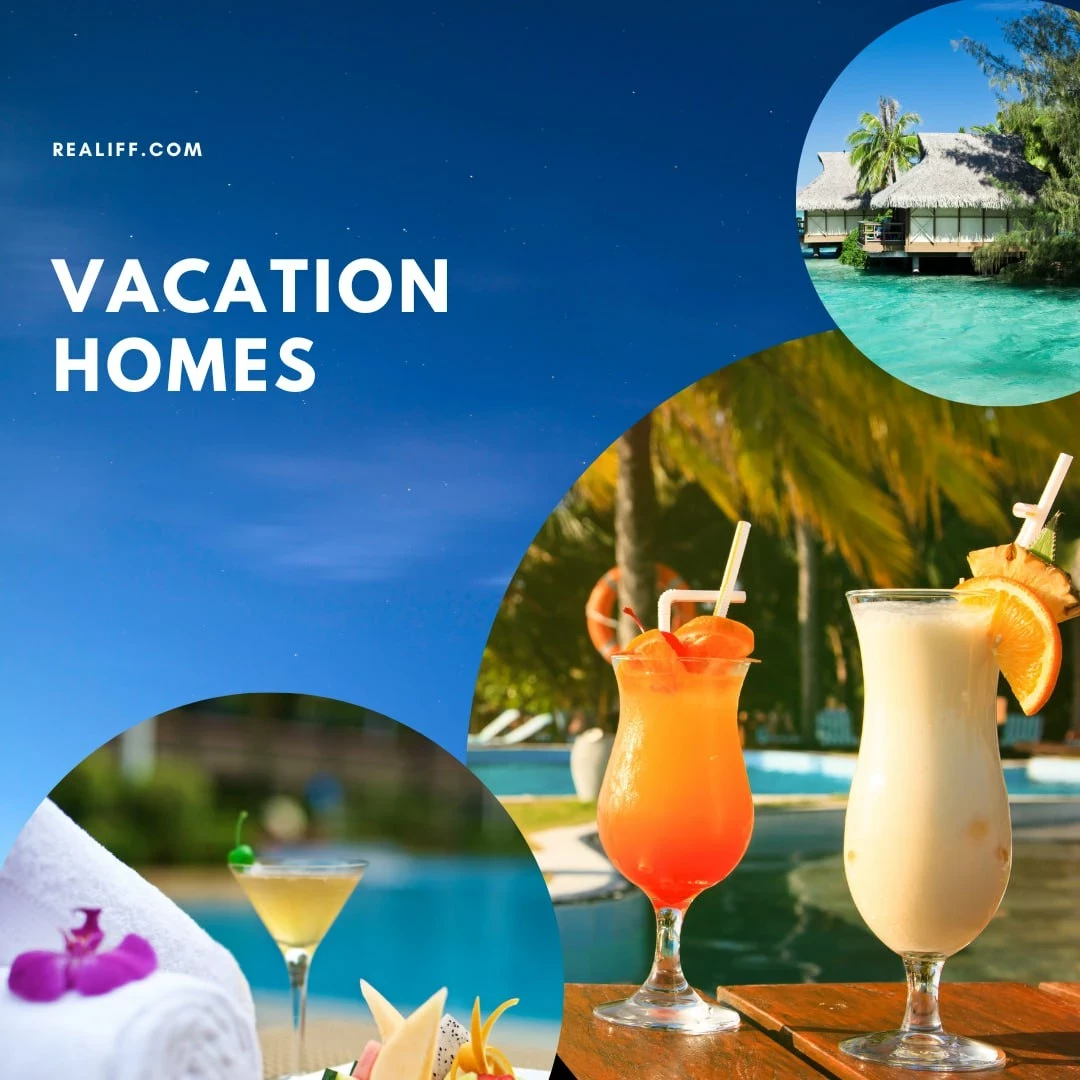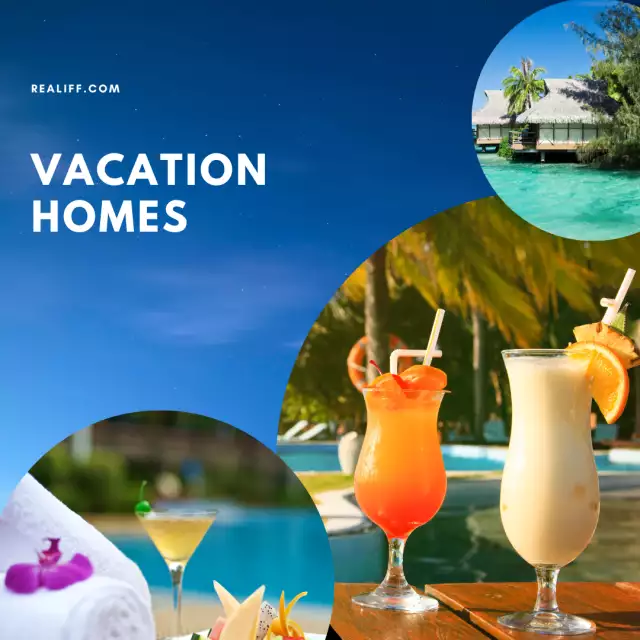Vacation homes: Tips for purchasing a second home or vacation property
Vacation homes: Tips for purchasing a second home or vacation property
When it comes to owning a vacation home, the process of purchasinga second property can be overwhelming. There are various factors to consider, from location to financing and rental potential. However, with careful planning and research, owning a vacation property can be a wise investment and a source of enjoyment for you and your family.
One of the most critical considerations when purchasing a vacation property is the location. Choosing the right location can impact your investment's long-term value, rental income potential, and overall enjoyment. In this guide, we will provide detailed information on location considerations when purchasing a second home or vacation property, including proximity to popular tourist destinations or recreational activities, accessibility and transportation options, climate and weather patterns, neighborhood, and community amenities, and property appreciation potential. By considering these factors, you can make an informed decision and select a location that aligns with your goals and preferences.
| Consideration | Description |
| Location | Accessibility, nearby attractions, community amenities |
| Financing Options | Mortgages, home equity loans |
| Rental Potential | Local rental markets, property management, regulations, taxes |
| Property Considerations | Age, condition, size, layout, amenities, homeowner association fees, appreciation potential |
Location Considerations
Choosing the right location for your vacation home is crucial for your investment's long-term value and enjoyment. Here are some additional details on the location considerations to remember when purchasing a second home or vacation property:
Proximity to popular tourist destinations or recreational activities:
Location is a key factor when purchasing a vacation property, especially if you plan to rent it out when not in use. Consider the proximity of the property to popular tourist destinations or recreational activities that attract visitors, such as beaches, mountains, lakes, or theme parks. The closer your property is to these attractions, the more demand it will have for vacation rentals, which can translate into higher rental income and property value in the long run.
Accessibility, transportation options, and infrastructure:
Consider how accessible the property is, and the transportation options available in the area, such as airports, train stations, or highways. If you plan to drive, consider the road conditions and traffic patterns in the area. Also, ensure that the area has the necessary infrastructure, such as hospitals, grocery stores, and restaurants, to meet your needs during your vacations.
Climate, weather patterns, and natural disasters risks:
The climate and weather patterns in the area where your vacation home is located can impact your enjoyment of the property and its long-term value. Consider the average temperatures, rainfall, and weather patterns during the peak and off-seasons. Also, be aware of natural disaster risks, such as hurricanes, wildfires, or flooding, that could impact the safety and comfort of your property.
Neighborhood and community amenities:
Consider the neighborhood and community amenities surrounding the property, such as public parks, beaches, golf courses, or restaurants. Research the area to ensure that it offers the activities and lifestyle you desire during your vacations. Also, consider the noise level and traffic in the area, and whether it aligns with your preferences for a vacation home.
Property appreciation potential:
Location can also impact the long-term appreciation potential of your vacation property. Consider whether the area is expected to grow and develop over time, with the potential for increased property values. Research local real estate trends and market projections to ensure that your investment aligns with your financial goals.
Overall, location is a critical factor when purchasing a second
home or vacation property. Take time to research and assess the
area's suitability for your needs, preferences, and investment
goals, and consult with a local real estate agent to ensure that
you make an informed decision.
![]() Financing Options
Financing Options
Financing a vacation property can be a complex process. Unlike primary residences, vacation homes are considered a luxury and may require higher down payments, interest rates, and stricter lending criteria. Here are some additional details on financing options to keep in mind when purchasing a second home or vacation property:
Traditional Mortgages:
One of the most common ways to finance a vacation property is through a traditional mortgage. Mortgage lenders typically require a higher down payment of 10% to 20% of the property's purchase price and may charge a higher interest rate than a primary residence. Additionally, lenders may have stricter credit scores and debt-to-income ratio requirements.
Home Equity Loans:
Another financing option is to use a home equity loan on your primary residence to purchase a vacation property. This type of loan allows you to borrow against the equity in your primary residence and use the funds to purchase the vacation property. However, keep in mind that home equity loans typically have higher interest rates than primary mortgages, and defaulting on the loan could result in foreclosure on your primary residence.
Cash Payment:
Purchasing a vacation property with cash is another option to consider. Paying in cash can offer several advantages, including no interest charges or mortgage payments, no lender fees or closing costs, and a faster, simpler closing process. However, keep in mind that tying up a significant amount of cash in a single asset could limit your financial flexibility and diversification.
Fractional Ownership:
Fractional ownership is a shared ownership arrangement where multiple buyers split the cost of purchasing and maintaining a vacation property. Each owner typically has the right to use the property for a certain number of days per year, with the remaining days available for rental. Fractional ownership can be an affordable way to own a vacation property, but it also comes with restrictions on usage and may limit your ability to sell or transfer ownership.
Overall, financing a vacation property requires careful consideration of your financial goals and capabilities. Consult with a qualified financial advisor or mortgage lender to assess your options and select a financing plan that aligns with your needs and budget.
Rental Potential
One of the advantages of owning a vacation property is the potential to generate rental income. Here are some additional details on rental potential considerations to remember when purchasing a second home or vacation property:
Local Rental Market:
Research the local rental market in the area where you plan to purchase a vacation property. Determine the average rental rates for similar properties and the demand for vacation rentals during peak and off-seasons. Consider factors such as proximity to popular tourist destinations or recreational activities, accessibility, and neighborhood amenities that could impact the property's rental potential.
Property Type:
Consider the property type that is most suitable for rental income. Some popular vacation rental properties include beachfront condos, cabins in the mountains, or villas in a resort. The property's size, layout, and amenities, such as a pool or hot tub, can also impact the rental potential.
Property Management:
Managing a vacation rental property can be time-consuming and challenging, especially if you do not live nearby. Consider hiring a property management company that can handle tasks such as advertising, bookings, cleaning, and maintenance. Property management companies typically charge a fee, usually a percentage of the rental income, but can save you time and stress in the long run.
Rental Regulations and Taxes:
Research the local rental regulations and taxes that apply to vacation rental properties in the area. Some municipalities or homeowner associations may have restrictions on rental periods or occupancy limits. Also, be aware of taxes such as sales tax, tourist tax, or occupancy tax that may apply to rental income and factor them into your financial projections.
Marketing and Advertising:
To attract renters, it is essential to market and advertises the vacation property effectively. Consider using online platforms such as Airbnb, VRBO, HomeAway, or local property management companies to promote the property to potential renters. Professional photos and a well-written description of the property's amenities and nearby attractions can also help attract renters.
Overall, the rental potential is a crucial factor to consider when purchasing a vacation property. Conduct thorough research on the local rental market, property type, management, regulations, and taxes to assess the property's rental income potential accurately. With careful planning and execution, a vacation property can generate rental income and increase its long-term value.
Property Considerations
When purchasing a vacation property, there are several property-specific considerations to remember. Here are some additional details on property considerations when purchasing a second home or vacation property:
Age and Condition:
Consider the age and condition of the property, particularly if you plan to rent it out. Older properties may require more maintenance and repair costs, while newer properties may have fewer maintenance issues. A property inspection can help identify any necessary repairs or upgrades before purchasing the property.
Size and Layout:
Consider the size and layout of the property concerning your needs and preferences. If you plan to use the property for family vacations, ensure it has enough space to accommodate everyone comfortably. If you plan to rent the property, consider the number of bedrooms and bathrooms and the overall layout's suitability for renters.
Amenities:
Evaluate the property's amenities and features, such as a pool, hot tub, outdoor living space, or waterfront access. These amenities can enhance your enjoyment of the property and increase its rental potential. However, keep in mind that additional amenities may require more maintenance and increase the property's overall costs.

Homeowner Association Fees:
Some vacation properties may be part of a homeowner association (HOA), which requires monthly or annual fees for maintenance, landscaping, and other services. Research the HOA fees and regulations before purchasing the property to ensure they align with your budget and preferences.
Property Appreciation Potential:
Consider the property's appreciation potential and long-term value. Research the property values in the area, the local real estate market, and any planned developments or improvements that could impact the property's value. Also, consider the property's rental income potential as a source of additional income and a factor that can impact its overall value.
Overall, property considerations are critical when purchasing a vacation property. Conduct thorough research on the property's age, condition, size, layout, amenities, homeowner association fees, and appreciation potential to make an informed decision that aligns with your goals and preferences.
In conclusion, purchasing a second home or vacation property can be a great investment for your family's long-term enjoyment and financial gain. However, it's essential to consider several factors when making this significant purchase. Location considerations such as accessibility, nearby attractions, and community amenities can impact the property's overall value and rental income potential. Financing options such as mortgages and home equity loans can provide flexibility in purchasing and funding renovations or improvements. Rental potential considerations, including local rental markets, property management, regulations, and taxes, can significantly impact the property's overall financial benefits. Lastly, property-specific considerations such as age, condition, size, layout, amenities, homeowner association fees, and appreciation potential should be considered to make an informed decision that aligns with your goals and preferences. By considering these factors, you can make a smart investment in a vacation property that will provide you with years of enjoyment and financial gain.





